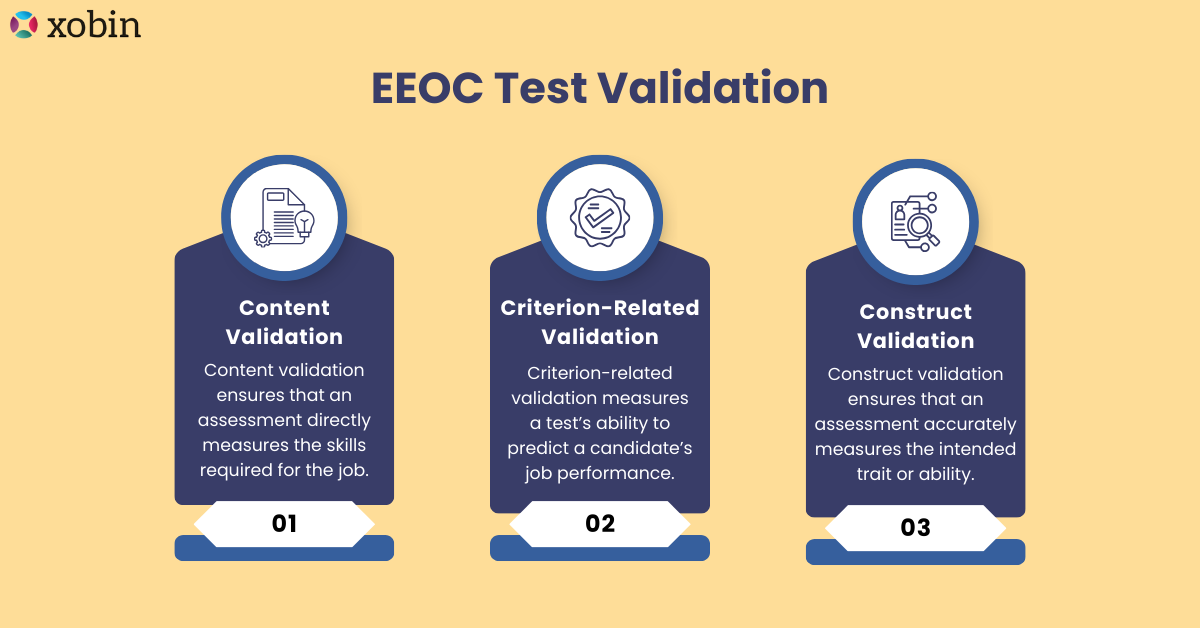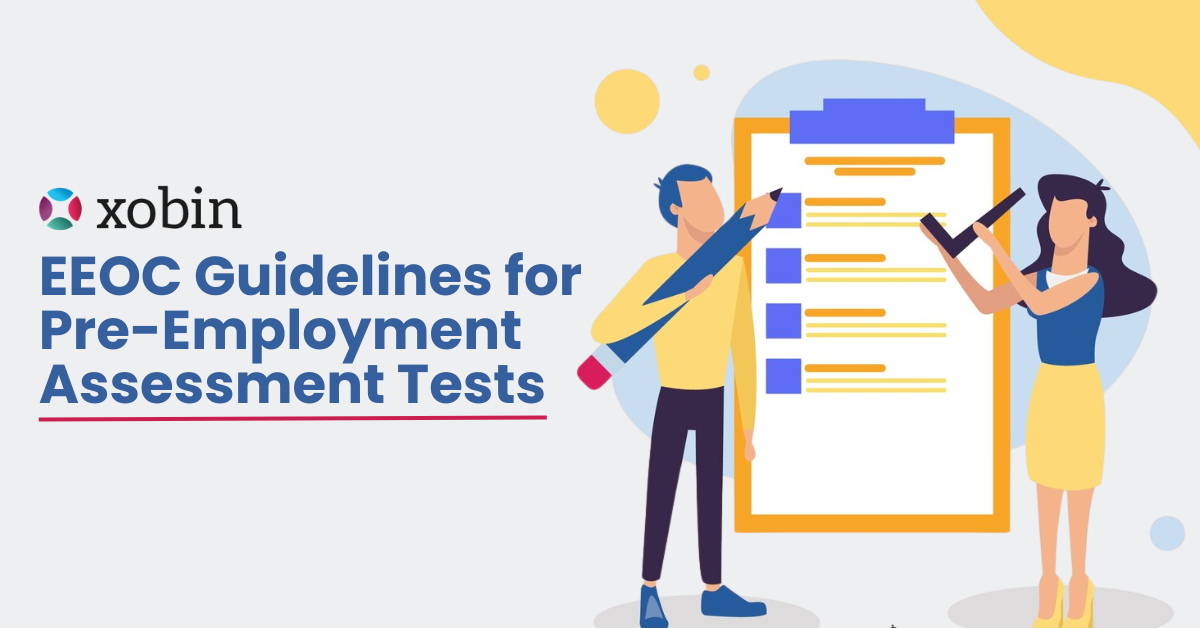Hiring the right talent is a crucial decision for any business, but it’s equally important to ensure that your recruitment practices are both effective and compliant. One area that many recruiters overlook is pre-employment testing, particularly when it comes to adhering to EEOC recruiting guidelines.
The Equal Employment Opportunity Commission (EEOC) provides clear regulations to ensure fairness in hiring and to protect against discrimination. Understanding these guidelines is essential for organizations that want to maintain compliance while building diverse and competent teams.
In this blog, we’ll discuss the EEOC guidelines for pre-employment assessment test, how they impact your hiring process, and how you can ensure that your pre-employment screening practices are compliant.
Table of Contents
What are the EEOC Guidelines?
The Equal Employment Opportunity Commission (EEOC) guidelines are a set of rules and standards that ensure employers conduct their hiring practices in a fair and non-discriminatory manner. These guidelines are designed to prevent discrimination based on factors like race, gender, age, disability, religion, and other protected characteristics under Title VII of the Civil Rights Act of 1964, as well as the Americans with Disabilities Act (ADA).
The EEOC’s primary goal is to ensure that hiring practices are based on the merit and qualifications of candidates, not their protected attributes. These guidelines also extend to pre-employment assessment tests, ensuring that such assessments do not unfairly disadvantage any group of individuals.
It’s important to remember that as a recruiter or employer, you must use hiring practices that are consistent with EEOC guidelines, including any form of assessment used to evaluate job candidates.
What is EEOC Test Validation?

EEOC test validation refers to the process of ensuring that any pre-employment assessment tests you use are job-related and consistent with the requirements of the job. This step is crucial for compliance with EEOC guidelines and ensures that your hiring process is both legal and practical. There are three primary types of validation that the EEOC recognizes:
Content Validation
Content validation ensures that an assessment directly measures the skills required for the job. The test should reflect actual tasks and responsibilities an employee will handle in their role. For example, a data entry operator position requires fast and accurate typing. A typing speed test is a valid and EEOC-compliant way to assess candidates.
Criterion-Related Validation
Criterion-related validation measures a test’s ability to predict a candidate’s job performance. Recruiters assess this by comparing test scores with actual employee performance metrics. For example, a sales company may implement a test to evaluate communication skills. If candidates who achieve higher scores excel in real sales scenarios, the test demonstrates strong criterion validity.
Construct Validation
Construct validation ensures that an assessment accurately measures the intended trait or ability. Researchers frequently apply this method to evaluate cognitive ability, personality, and problem-solving assessments.
For example, a leadership psychometric assessment must assess traits like decision-making, problem-solving, and team management. When the evaluation consistently identifies strong leaders, it demonstrates construct validity.
Pre-Employment Testing Laws & Regulations
Ensuring fairness in hiring is crucial for businesses to stay compliant with EEOC guidelines and build an inclusive workforce. The Equal Employment Opportunity Commission (EEOC) provides clear regulations to help employers implement fair, legally compliant hiring practices. Here are some key pre-employment testing laws and regulations:
1. Title VII of the Civil Rights Act of 1964
Title VII plays a crucial role in shaping pre-employment assessment tests by prohibiting discrimination based on race, color, religion, sex, or national origin. Employers must ensure their hiring practices, including assessments, comply with this law to promote fair and equitable hiring.
Under Title VII of the Civil Rights Act of 1964, organizations must validate employment tests to confirm they do not disproportionately disadvantage protected groups, such as minorities, women, or older workers.
- Every test must directly relate to the job and align with business necessities.
- If an assessment disproportionately excludes individuals from protected classes, employers must provide substantial evidence proving its ability to predict job performance accurately.
2. Americans with Disabilities Act (ADA) – 1990
The Americans with Disabilities Act (ADA) protects individuals with disabilities from discrimination in all areas of employment, including pre-hire assessments. If a candidate has a disability, employers must provide reasonable accommodations to ensure they can complete the test reasonably.
These accommodations may include extra time, alternative formats, or modified test conditions. By making these adjustments, employers create an equal opportunity for all candidates to demonstrate their skills without their disability affecting their performance.
- If a test excludes a person with a disability, the employer must provide an alternative method of assessment that accommodates the disability.
- Employers are prohibited from using discriminatory tests that disproportionately screen out individuals with disabilities unless the test is necessary for the job.
3. The Age Discrimination in Employment Act (ADEA) – 1967
The Age Discrimination in Employment Act (ADEA) protects individuals aged 40 and older from employment discrimination. It prohibits explicitly age-based discrimination in hiring, firing, promotion, or compensation.
- Pre-employment skills tests should only impact older applicants if they directly relate to the job and are essential for the role.
- Tests should focus only on job-related skills and avoid evaluating traits like physical strength unless the role specifically requires it.
4. The Fair Credit Reporting Act (FCRA) – 1970
The Fair Credit Reporting Act (FCRA) sets rules for conducting background and credit checks during hiring. Use a third-party service to perform background checks or check candidate’s credit histories. You must follow specific requirements outlined by the FCRA to protect the candidate’s privacy and ensure fair treatment.
- Employers must obtain written consent from candidates before running a background check or reviewing their credit history.
- If an employer makes a hiring decision based on a background check, they must inform the candidate.
- Candidates have the right to know what information influenced the hiring decision and whether it impacted their chances of getting the job.
5. The Equal Pay Act of 1963
The Equal Pay Act mandates that employers compensate men and women equally for performing the same work. Although this law does not directly regulate pre-employment assessment tests, it reinforces the need for fair and non-discriminatory hiring practices. Recruiters must carefully evaluate any assessment that could unintentionally create gender-based pay disparities to ensure compliance and maintain equity in the hiring process.
- Employers should ensure that their hiring assessments do not have a disparate impact based on gender, leading to pay inequality.
- Employers must validate pre-employment assessment tests to prevent gender-based discrimination.
6. State-Specific Employment Laws
In addition to federal laws, many states have specific laws that regulate pre-employment assessment tests. Some states, like California and New York, have additional protections for workers that may extend beyond federal laws. For example, certain states may have more stringent rules regarding background checks or additional accommodations for individuals with disabilities.
- Be sure to research the employment laws specific to your state or region to stay fully compliant.
- Specific industries, such as healthcare or finance, may have additional regulatory requirements for pre-employment screening tests.
Types of EEOC-Compliant Pre-Employment Tests
EEOC guidelines permit pre-employment assessment tests that are valid, job-related, and non-discriminatory under the Uniform Guidelines on Employee Selection Procedures (UGESP). Understanding the types of pre-employment tests that the EEOC authorizes helps recruiters design an effective hiring process while avoiding legal risks. Here are the primary pre-employment assessments that are considered EEOC-compliant when used correctly.
1. Cognitive Ability Tests
Cognitive ability tests, also called intelligence or aptitude tests, measure a candidate’s general mental capabilities. They assess reasoning, problem-solving, learning ability, and understanding of complex information. Employers use these tests to identify candidates who can excel in roles that require critical thinking, analytical skills, or problem-solving.
EEOC Compliance Guidelines:
- These tests must be job-related and should be able to predict job performance effectively.
- The test should not disproportionately disadvantage candidates from protected groups (such as minority racial groups or older workers).
- Proper validation of the test is required to show that the test results correlate with the candidate’s performance on the job.
2. Personality Tests
Personality tests are designed to assess various personality traits and behaviors, including a candidate’s attitude, motivation, emotional stability, and interpersonal style. Additionally, psychometric testing helps employers evaluate the behavioral traits of candidates. These assessments predict how well a candidate might fit within a company’s culture or handle the demands of a specific role, especially in areas like sales, management, or customer service.
EEOC Compliance Guidelines:
- Personality tests should not be used to discriminate against any group.
- Questions should focus on work-related traits and not personal life or medical conditions.
- Employers must avoid using personality tests that stigmatize certain groups or reveal disabilities, which could violate the Americans with Disabilities Act (ADA).
3. Skills Assessment Tests
Skills assessment tests assess the specific abilities required for a job, such as technical skills, software proficiency, typing speed, or language proficiency. These tests are designed to evaluate whether a candidate possesses the necessary skills to perform the core tasks of a job role.
EEOC Compliance Guidelines:
- Skills testing should be directly relevant to the job for which the candidate is being considered.
- The test should measure objective skills and provide a fair comparison among candidates.
- Employers must ensure that test results accurately predict job performance and are validated for reliability.
4. Integrity and Ethics Tests
Integrity and ethics tests help employers evaluate a candidate’s honesty, ethical behavior, and trustworthiness. Companies often use these tests for roles that involve handling money, managing sensitive information, or interacting with customers. By identifying potential risks, integrity tests help predict whether a candidate might engage in counterproductive actions like theft, dishonesty, or fraud.
EEOC Compliance Guidelines:
- Integrity tests should focus on behaviors that are directly related to job performance (e.g., reliability and adherence to ethical standards).
- Employers must ensure that the questions in these tests do not lead to adverse impacts on protected groups.
- Construct validity is critical to ensure the test accurately measures integrity traits and has predictive value for the job.
5. Physical Ability Tests
Physical ability tests assess whether a candidate has the physical capabilities to perform the tasks required by a job. These tests are standard in jobs that require lifting, manual labor, or physical endurance. Examples include testing for strength, flexibility, or cardiovascular endurance.
EEOC Compliance Guidelines:
- Employers must ensure these tests are essential to job performance and not used to exclude specific demographics.
- Employers must make suitable accommodations for people with disabilities under the Americans with Impairments Act (ADA).
- These tests should not disproportionately exclude women or older workers unless they directly impact job safety or efficiency.
6. Situational Judgment Tests (SJTs)
Situational Judgment Tests assess how candidates respond to hypothetical, job-related situations. These tests help employers evaluate candidate’s decision-making, problem-solving, and interpersonal skills by presenting them with real-life scenarios they might encounter on the job. Candidates must choose or rate the best course of action based on the given options.
EEOC Compliance Guidelines:
- Test questions must be based on actual job situations and not personal beliefs or unrelated competencies.
- Scoring must follow a standardized, unbiased process to ensure fairness.
- Tests should undergo validation to confirm their ability to predict job performance accurately.
7. Emotional Intelligence (EQ) Tests
Emotional intelligence tests measure a candidate’s self-awareness, empathy, adaptability, and ability to manage relationships. These are particularly useful for leadership and customer-facing roles.
EEOC Compliance Guidelines:
- Tests should only assess work-related emotional competencies and not psychological health.
- Employers must ensure the test does not favor one group over another unfairly.
- The assessment should have a strong correlation with job performance to be considered valid.
8. Drug Tests
Employers conduct drug tests to check if a candidate is using illegal substances or misusing prescription medications. Although industries like transportation and healthcare rely on drug testing the most, many other sectors are now adopting it. This growing trend helps ensure workplace safety, compliance, and productivity.
EEOC Compliance Guidelines:
- Employers must be cautious of discriminating against individuals who are recovering from substance abuse and may require reasonable accommodations under the Americans with Disabilities Act (ADA).
- Drug tests should be consistent across all candidates for fairness
How to Implement EEOC-Compliant Pre-Employment Assessment?
Test Creation: Focus on Job-Relevant Skills
A pre-employment assessment must be directly related to the skills and knowledge required for the job. Any test content that evaluates unrelated abilities can introduce unintentional bias and may violate EEOC guidelines. For instance, when hiring for a Junior Accountant position, the test should assess relevant skills such as:
- MS Excel proficiency
- Knowledge of accounting software like QuickBooks
- Understanding of financial statements
However, the test should not include unrelated topics like marketing strategies or supply chain management, as these do not directly apply to an accountant’s role. By ensuring content relevance, employers create a fair and legally defensible hiring process.
Test Usage: Ensure Equal Application for All Candidates
To comply with EEOC guidelines, organizations must give pre-employment tests to all candidates in the same way. Testing only specific candidates while excluding others violates EEOC rules and can result in legal issues. Employers cannot choose who takes an assessment based on factors like age, gender, race, or nationality. Instead, they must use standardized tests for all applicants. This approach ensures a fair hiring process and provides equal opportunities for everyone.
Shortlisting Criteria: Maintain Transparency & Fairness
The shortlisting process must be transparent and based on objective criteria. EEOC guidelines mandate that hiring decisions remain free from bias or discrimination against any group.
- Consistency in Shortlisting: If recruiters decide to shortlist candidates scoring above “X,” they must apply this rule uniformly across all applicants.
- Fair Rejection Policy: If a candidate meeting the criteria gets rejected, recruiters must document a valid, job-related reason, such as insufficient work experience or a low interview score.
Here’s an example of EEOC-compliant shortlisting: A company sets 75% as the minimum passing score for an IT analyst skills test. Every candidate meeting or exceeding this score receives equal consideration, regardless of background.
Avoiding Discriminatory Practices in Interviewing
Once you shortlist candidates, the next step is to conduct interviews. During this stage, it’s essential to follow EEOC-compliant practices. Make sure every interview question relates to the job, treats all candidates fairly, and follows a standardized format. This approach helps prevent unconscious bias and ensures hiring decisions are based on merit.
Documenting and Justifying Hiring Decisions
The EEOC guidelines highlight the need to document hiring decisions to prove compliance in case of legal review. When selecting a candidate, recruiters should record how test scores and qualifications influenced the decision. Likewise, if they reject a candidate, they must provide an apparent, objective reason. Keeping detailed records helps ensure fairness and prevents any appearance of discrimination.
Best Practices for EEOC-Compliant Hiring Assessments
To ensure compliance with EEOC guidelines for hiring, employers should implement the following best practices when using pre-employment assessments:
1. Use Only Job-Related, Validated Tests
Employers must ensure that all pre-employment assessment tests directly relate to job requirements. Tests should measure skills, cognitive abilities, or personality traits that are essential for job performance. Using validated assessments with psychometric properties minimizes bias and strengthens the legal defensibility of hiring decisions.
2. Conduct Regular Adverse Impact Analysis
An adverse impact analysis identifies whether a test unfairly excludes certain groups. If the analysis reveals bias, employers must either adjust the test or prove its job-related necessity. This process ensures fair hiring practices and helps companies comply with EEOC standards.
3. Provide Reasonable Accommodations for Disabled Candidates
Under ADA regulations, employers must make hiring tests accessible to candidates with disabilities. This may include alternative testing formats, extended time limits, or assistive technology to ensure fairness.
4. Ensure Consistency in Test Administration
To avoid claims of discrimination, employers should administer a pre-employment assessment test consistently for all applicants. Testing conditions, instructions, and evaluation criteria must remain the same for every candidate to ensure an equal hiring process.
5. Document Testing Processes and Compliance Measures
Employers need to keep detailed records of their hiring assessments, including test validation studies, adverse impact reports, and candidate performance data. Maintaining proper documentation helps protect against legal challenges under EEOC regulations. If a hiring decision comes into question, these records provide clear evidence of fair and unbiased selection practices.
6. Train Hiring Managers on EEOC Compliance
Employers should conduct regular EEOC compliance training for HR professionals and hiring managers. Training should cover pre-employment testing laws, anti-discrimination policies, and best practices for fair candidate evaluation. Well-informed hiring teams are less likely to make decisions that violate EEOC hiring guidelines.
7. Stay Updated with EEOC Guidelines and Legal Changes
Employment laws evolve, and businesses must stay informed about new EEOC regulations. Employers should routinely review EEOC updates, court rulings, and legal guidance to ensure ongoing compliance with fair hiring practices.
Legal Benefits of EEOC-Compliant Pre-Employment Testing
Ensuring that pre-employment assessment tests comply with EEOC guidelines is not just about avoiding discrimination claims. It also provides significant legal advantages. By following federal employment laws, companies can streamline hiring while protecting themselves from costly lawsuits and reputational damage. Below are the key legal benefits of using EEOC-compliant pre-employment skills assessments.
1. Protection Against Discrimination Lawsuits
One of the most significant legal benefits of a compliant pre-employment assessment test is protection against lawsuits related to hiring discrimination. The EEOC enforces federal laws like Title VII of the Civil Rights Act, ensuring that hiring practices do not discriminate based on race, gender, age, disability, or other protected characteristics. By using validated and job-related tests, employers minimize the risk of legal action and ensure fairness in candidate selection.
2. Avoidance of Adverse Impact Claims
A poorly designed test can unfairly exclude certain demographic groups. To prevent this, companies must conduct an adverse impact analysis as required by EEOC guidelines. This analysis ensures that the hiring process remains fair for everyone. Using a legally compliant pre-employment assessment test helps employers avoid accusations of unintentional discrimination. These tests must be scientifically validated and applied consistently to all candidates, ensuring fairness and compliance with legal standards.
3. Alignment with the Uniform Guidelines on Employee Selection Procedures (UGESP)
The UGESP sets legal standards to ensure hiring tests are fair and effective. Employers who follow these guidelines create legally defensible pre-employment tests, meaning their assessments can hold up under EEOC investigations or legal challenges. This approach helps organizations maintain compliance and provides documented proof if anyone questions their hiring process.
4. Reduced Legal Liability in Hiring Decisions
EEOC-compliant assessments help companies make fair hiring decisions based on skills and qualifications rather than personal biases. As a result, businesses lower the risk of negligent hiring claims, which can arise if they hire an unqualified or unsafe employee. When companies use validated and job-related pre-employment tests, they create a legal safeguard that protects them from potential liability.
5. Standardized Hiring Process to Prevent Bias
A structured and legally compliant pre-employment evaluation process ensures all candidates are evaluated relatively using the same criteria. This reduces bias in hiring and prevents subjective decision-making that could lead to discrimination claims. A standardized approach also demonstrates compliance with EEOC guidelines, reinforcing the organization’s commitment to equal-opportunity hiring.
6. Stronger Defense in EEOC Audits and Investigations
If an organization faces an EEOC audit or investigation, having documented proof of compliant testing procedures serves as a strong legal defense. Employers who can demonstrate that their hiring assessments are job-related, validated, and non-discriminatory are better positioned to defend themselves against legal challenges. This proactive approach prevents penalties and protects the company’s reputation.
Evaluate Candidates with EEOC Compliant Pre-Hire Test
Xobin takes compliance seriously! Our pre-employment testing software ensures 100% compliance with EEOC, ADA, and FCRA laws, giving you the confidence to hire the best candidates without legal concerns. With scientifically validated assessments, automated compliance checks, and AI-driven insights, Xobin helps you make data-backed hiring decisions that align with federal employment laws.
Ready to implement fair and EEOC-compliant hiring assessments? Book a personalized demo today!






